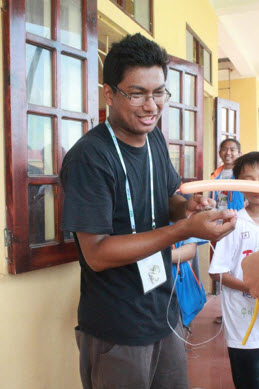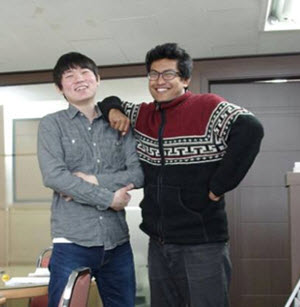There has been an increase in the number of international students studying in Seoul National University (SNU). This interview series attempts to provide an insight on what student life is like from the perspective of international students. It focuses on students in the department of engineering in SNU.
Engineering students often complain about the lack of time they have that prevents them from doing anything outside their department. Students are oftentimes unable to get out of the infamous Building 301 where the College of Engineering is located. Being true to his engineering roots, Abhas Maskey expressed his preference to conduct the following interview online, with questions and answers being tossed back and forth in the comfort behind the screen.
It is a pleasure to be able to conduct this interview with you. Please give our readers an idea of who you are.
My name is Abhas Maskey and I am from Nepal. I am pursuing my Master’s Degree in the Department of Aerospace Engineering from this year, after completing my undergraduate from the same department in Seoul National University. In total, I have been here at SNU for about four and a half years now.
Nepal is far from here. What led you to come to Korea, and SNU specifically?
Coming to Korea was quite a random choice. Like most of my friends, my initial plan was to go to the US but then I couldn’t find a college that was willing to pay for my tuition in the major I wanted to study. I had almost packed up my bags to leave for India but I heard from a senior of mine, who was doing his PhD here, about Seoul National University and about its programs. He informed me of the degree available here, so I decided to apply and was accepted. Next thing I know, I am on the plane headed out to Seoul.
For someone who was not planning to come to SNU in the beginning, it is interesting that you decided to stay for your master’s degree. What got you to stay?
In my senior year, while working on my thesis, I came to know that SNU was building its own nano-scaled satellite called a CubeSat. As I got to work on the imaging payload and learn more about the system as a whole, I decided that this was what I wanted to do for my master’s as well. After interning at the same laboratory that I am now a graduate student in, I made up my mind that this was what I really wanted to do. I joined Professor JEUNG In Seuck’s Aerospace Propulsion & Combustion (APCL) lab where I am currently a graduate candidate. I have never looked back since.

That sounds very complicated. Can you explain to us non-engineers exactly what that is?
The idea was first brought forth by Professor Bob Twiggs at Stanford University. A CubeSat is basically what the name suggests. It is a cube but it functions as a basic satellite for space research. The whole idea of developing such a system is to teach students to build a fully functional satellite, which is capable of performing experiments or earth imaging missions in low earth orbit. However, this format of nano-satellite has gained much interest from non-educational fields as well. This system basically uses commercial, off-the-shelf components and has a short development period. This makes it far cheaper than normal satellites. Even countries like Nepal could possibly profit from such platforms. What really interests me is its potential to help countries like Nepal to launch its own miniature space missions to combat issues of climate change and flash floods and perhaps build a self-sustaining early warning system for impending catastrophes. That might well be the way back home for me.
You mentioned home. What differences and similarities do you notice between Nepal and Korea?
Nepal shares much of the typical Asian cultural values of how you behave in front your elders. Besides that, I see a lot of differences than similarities.
Korea, as you might have already noticed, moves in an entirely different pace, in an entirely different dimension. Work ethic and discipline is given so much importance here. Yes, it could be because the individuals themselves are both highly competent and competitive but the social structure itself prompts people to be so in the first place. On the flipside though, I know most people aren’t happy about how things are in their life. People are overworked and stressed just to keep up with what the society tags “normal lifestyle” to be. For most of my friends in the engineering school, it has always been that way and sadly, shall remain so in the near future. If this is what people call development, then I don’t see the point for lesser nations to become one.
I feel that’s an area where Nepal seems to be doing pretty well; but at an expense of a better, robust state. I have been involved in a handful of community development projects and it strikes me how relaxed and laidback we, as Nepalese, really are. It really is appalling to notice the work discipline back home once you have already seen how people grind themselves here.
And on a lighter note, there’s a lot of drinking involved in Korea.
During your undergraduate years in SNU, what was the most memorable experience you had?
I was fortunate to have been selected for SNU’s volunteer program to Vietnam and oh boy, did I have a great time there! Our ten-day visit was particularly focused on building friendship with young Vietnamese students, teaching them an assortment of different topics and activities. I hope they enjoyed the experience as much as we did while interacting with them. Also, the team that was tailored together was a pleasure to work with. I had an absolutely amazing time goofing around with them and I guess they enjoyed my company too.
What are some of the challenging aspects of being a foreign student in SNU?
First of all, there is the issue of adaptation. It really does differ from person to person; some people might find it easier coping with the language, the food and the educational system that SNU is based on, but some people might find it very hard to adjust even if he or she has been around for some time. I mean, I still struggle with the language. The consequence of this is that I have to choose between a select few classes that are available in English. It is true that the situation is much better here but still, I can’t take classes I really want to take.
The other issue would be with that most international students are isolated from their class. Isolated in terms of both access to class materials of previous years and help from peers and seniors alike. Having come from a residential school, a key part of my education was learning from the people around me. I guess that wasn’t the case for most of my time here.
What tips/advice could you give to prospective foreign students about SNU and/or life in Korea?
First things first, it is important to understand that Korean students who make it into SNU are the crème de la crème. Don’t get me wrong, it’s not that we, as foreign students, are not competent enough. I am sure most of us went to top schools in our respective countries. However, the system in which we were brought up and the system that these students are accustomed to are miles apart. And even that would be an understatement. What I am saying is that it is normal to go through an early 20’s “what am I doing here?” crisis. Every foreigner here has been through that and I am sure they will have very entertaining stories to tell. Especially, when they are under influence of Korea’s generic liquor.

I see the most important way to cushion the fall would be to study the language for a year before heading out to college. In doing so, you will not only get accustomed to the default language but also the culture and the overall system of how things work here. There is a marked difference in performance in people who have had that experience and those who have not. On a final note, being an extrovert will help immensely. It is important to make friendships, build relationships and become as social as possible because, in the end, you are on your own here. Having people here to support you and guide you will be the key.
Written by OH Jung Eun, SNU English Editor, josefinaoh@snu.ac.kr
Reviewed by Eli Park Sorensen, SNU Professor of Liberal Studies, eps7257@snu.ac.kr

